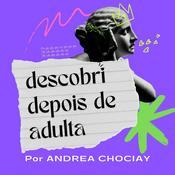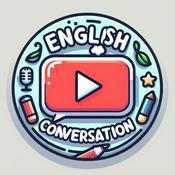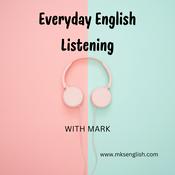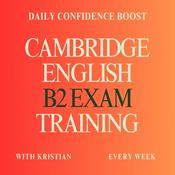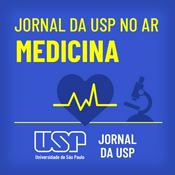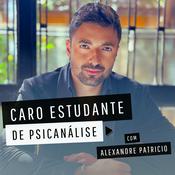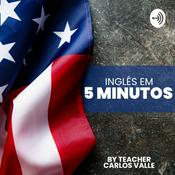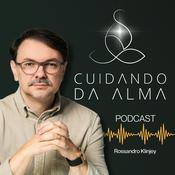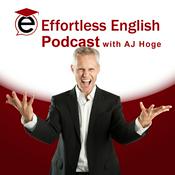297 episódios
- The vocabulary and story transcript to today's B2 story:
https://www.practisingenglish.com/podcast-297.htm
1. define
It is sometimes difficult to define success, because it means different things to different people.
2. an act of will
Finishing the marathon after injuring his ankle was purely an act of will.
3. upside down
When I turned the map upside down, I finally realized I had been reading it the wrong way.
4. What on earth happened?
The kitchen was covered in flour and broken plates—what on earth happened while I was out?
5. something daring
She decided to do something daring and quit her stable job to start her own business.
6. stare in disbelief
He could only stare in disbelief when he saw his small village on the international news.
7. Don’t talk nonsense!
Don’t talk nonsense! Of course you can pass the exam if you prepare properly.
Contact Mike Bilbrough with a question or enquiry about advertising on Practising English Podcasts: https://www.practisingenglish.com/contact.htm
My NEW book: "B1 English Vocabulary Builder - 22 Short Stories for Learning the Words and Phrases Students Need to Pass the B1 Exam" is now available! This book gives the learner enough vocabulary to pass any B1 exam (special help for Cambridge exams).
To read more about my book, click here (you can access it from any Amazon platform):
https://amzn.to/46AVFe9
Learners studying towards B2 level will be interested in my B1 to B2 reader: The Tudor Conspiracy (includes audio version) https://amzn.to/4gPsj0i
For very young learners (from 8-10), I recommend my picture reader book for children learning A1 to A2 English. It comes with a fully dramatised audio version: https://amzn.to/46TCWvv
Oxford Bookworm Graded Readers: Read stories at your level to improve your English. I recommend Oxford Bookworms as the best series of books for learners: https://amzn.to/4r7YVHg
At https://www.practisingenglish.com/ I offer learners of intermediate-level English, free grammar help and exercises and other English lear... - These are the words I'll be studying today:
Transcript at my website: https://www.practisingenglish.com/podcast-296.htm
treasure
to sail
crew
sailor
the docks
ship
telescope
crutch
pirate
the squire
All hands on board!
aye, aye, sir!
a schooner
Contact Mike Bilbrough with a question or enquiry about advertising on Practising English Podcasts: https://www.practisingenglish.com/contact.htm
My NEW book: "B1 English Vocabulary Builder - 22 Short Stories for Learning the Words and Phrases Students Need to Pass the B1 Exam" is now available! This book gives the learner enough vocabulary to pass any B1 exam (special help for Cambridge exams).
To read more about my book, click here (you can access it from any Amazon platform):
https://amzn.to/46AVFe9
Learners studying towards B2 level will be interested in my B1 to B2 reader: The Tudor Conspiracy (includes audio version) https://amzn.to/4gPsj0i
For very young learners (from 8-10), I recommend my picture reader book for children learning A1 to A2 English. It comes with a fully dramatised audio version: https://amzn.to/46TCWvv
Oxford Bookworm Graded Readers: Read stories at your level to improve your English. I recommend Oxford Bookworms as the best series of books for learners: https://amzn.to/4r7YVHg
At https://www.practisingenglish.com/ I offer learners of intermediate-level English, free grammar help and exercises and other English lear... - You can read the transcript here at my website: https://www.practisingenglish.com/podcast-295.htm
The B2 words I study today are these:
· without hesitation
She accepted the job offer without hesitation because it matched her skills perfectly.
· take pride in something
He takes pride in his work and always tries to do his best, even under pressure.
· talk this over
Let’s talk this over tomorrow when we’re both calmer and have more time.
· I shivered (with fear)
I shivered with fear when I heard footsteps behind me in the dark street.
· from time to time
From time to time, I like to turn off my phone and spend the evening reading.
· haunted
She was haunted by the memory of the accident and found it hard to move on.
Contact Mike Bilbrough with a question or enquiry about advertising on Practising English Podcasts: https://www.practisingenglish.com/contact.htm
My NEW book: "B1 English Vocabulary Builder - 22 Short Stories for Learning the Words and Phrases Students Need to Pass the B1 Exam" is now available! This book gives the learner enough vocabulary to pass any B1 exam (special help for Cambridge exams).
To read more about my book, click here (you can access it from any Amazon platform):
https://amzn.to/46AVFe9
Learners studying towards B2 level will be interested in my B1 to B2 reader: The Tudor Conspiracy (includes audio version) https://amzn.to/4gPsj0i
For very young learners (from 8-10), I recommend my picture reader book for children learning A1 to A2 English. It comes with a fully dramatised audio version: https://amzn.to/46TCWvv
Oxford Bookworm Graded Readers: Read stories at your level to improve your English. I recommend Oxford Bookworms as the best series of books for learners: https://amzn.to/4r7YVHg
At https://www.practisingenglish.com/ I offer learners of intermediate-level English, free grammar help and exercises and other English lear... - These are the questions for the story today. You can see the complete audioscript for the story at my website:
https://www.practisingenglish.com/podcast-294.htm
1) Why wouldn't the people from the village help Jim and his mother?
2) How much money did Jim's mother take from the chest (box)?
3) How did the blind man and his men get into the inn?
4) What was inside the packet that Jim found inside the chest?
Contact Mike Bilbrough with a question or enquiry about advertising on Practising English Podcasts: https://www.practisingenglish.com/contact.htm
My NEW book: "B1 English Vocabulary Builder - 22 Short Stories for Learning the Words and Phrases Students Need to Pass the B1 Exam" is now available! This book gives the learner enough vocabulary to pass any B1 exam (special help for Cambridge exams).
To read more about my book, click here (you can access it from any Amazon platform):
https://amzn.to/46AVFe9
Learners studying towards B2 level will be interested in my B1 to B2 reader: The Tudor Conspiracy (includes audio version) https://amzn.to/4gPsj0i
For very young learners (from 8-10), I recommend my picture reader book for children learning A1 to A2 English. It comes with a fully dramatised audio version: https://amzn.to/46TCWvv
Oxford Bookworm Graded Readers: Read stories at your level to improve your English. I recommend Oxford Bookworms as the best series of books for learners: https://amzn.to/4r7YVHg
At https://www.practisingenglish.com/ I offer learners of intermediate-level English, free grammar help and exercises and other English lear... - These are the 7 B2 words I discuss during the podcast:
https://www.practisingenglish.com/podcast-293.htm
1) rolled
2) feared
3) shade
4) dragged
5) unwilling
6) endless
7) uneasy
Contact Mike Bilbrough with a question or enquiry about advertising on Practising English Podcasts: https://www.practisingenglish.com/contact.htm
My NEW book: "B1 English Vocabulary Builder - 22 Short Stories for Learning the Words and Phrases Students Need to Pass the B1 Exam" is now available! This book gives the learner enough vocabulary to pass any B1 exam (special help for Cambridge exams).
To read more about my book, click here (you can access it from any Amazon platform):
https://amzn.to/46AVFe9
Learners studying towards B2 level will be interested in my B1 to B2 reader: The Tudor Conspiracy (includes audio version) https://amzn.to/4gPsj0i
For very young learners (from 8-10), I recommend my picture reader book for children learning A1 to A2 English. It comes with a fully dramatised audio version: https://amzn.to/46TCWvv
Oxford Bookworm Graded Readers: Read stories at your level to improve your English. I recommend Oxford Bookworms as the best series of books for learners: https://amzn.to/4r7YVHg
At https://www.practisingenglish.com/ I offer learners of intermediate-level English, free grammar help and exercises and other English lear...
Mais podcasts de Ensino
Podcasts em tendência em Ensino
Sobre Practising English
Listening practice for learners of B1 intermediate and B2 upper-intermediate levels of British English. Learn British English by listening to stories. Original and exciting stories written for learners and students of British English. Practise and prepare for Cambridge: B1 PET Preliminary and FCE First Certificate exams. IELTS: level 4, level 5 and level 6. Includes English grammar explanations and practice exercises, examples of vocabulary use, phrasal verbs and collocations help, British English pronunciation practice, advice and help for passing B1 and B2 English examinations: Cambridge, IELTS and Trinity. Start practising and improving your British English listening, vocabulary and speaking levels today!
Site de podcastOuça Practising English, All Ears English Podcast e muitos outros podcasts de todo o mundo com o aplicativo o radio.net
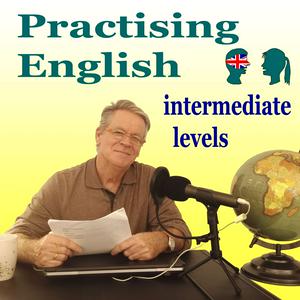
Obtenha o aplicativo gratuito radio.net
- Guardar rádios e podcasts favoritos
- Transmissão via Wi-Fi ou Bluetooth
- Carplay & Android Audo compatìvel
- E ainda mais funções
Obtenha o aplicativo gratuito radio.net
- Guardar rádios e podcasts favoritos
- Transmissão via Wi-Fi ou Bluetooth
- Carplay & Android Audo compatìvel
- E ainda mais funções


Practising English
Leia o código,
baixe o aplicativo,
ouça.
baixe o aplicativo,
ouça.






